ACCT6007 Financial Accounting: Critical Analysis of AI & Blockchain
VerifiedAdded on 2023/06/13
|8
|1933
|205
Case Study
AI Summary
This case study critically evaluates Daniel Hood's article on the impact of Artificial Intelligence (AI) and blockchain on the accounting profession. It explores the evolution of these technologies in the financial sector, assessing whether they pose a threat or offer opportunities for accountants. The analysis covers the techniques and procedures involved in blockchain technology, its potential to reduce malpractices, and its implications for traditional accounting roles. The study also reviews the role of OCR technology and suggests that while AI and blockchain may automate routine tasks, they also provide accountants with new tools for planning, valuation, and resource management. The conclusion emphasizes that adapting to these technological advancements is crucial for accountants to remain relevant and competitive in the evolving financial landscape.
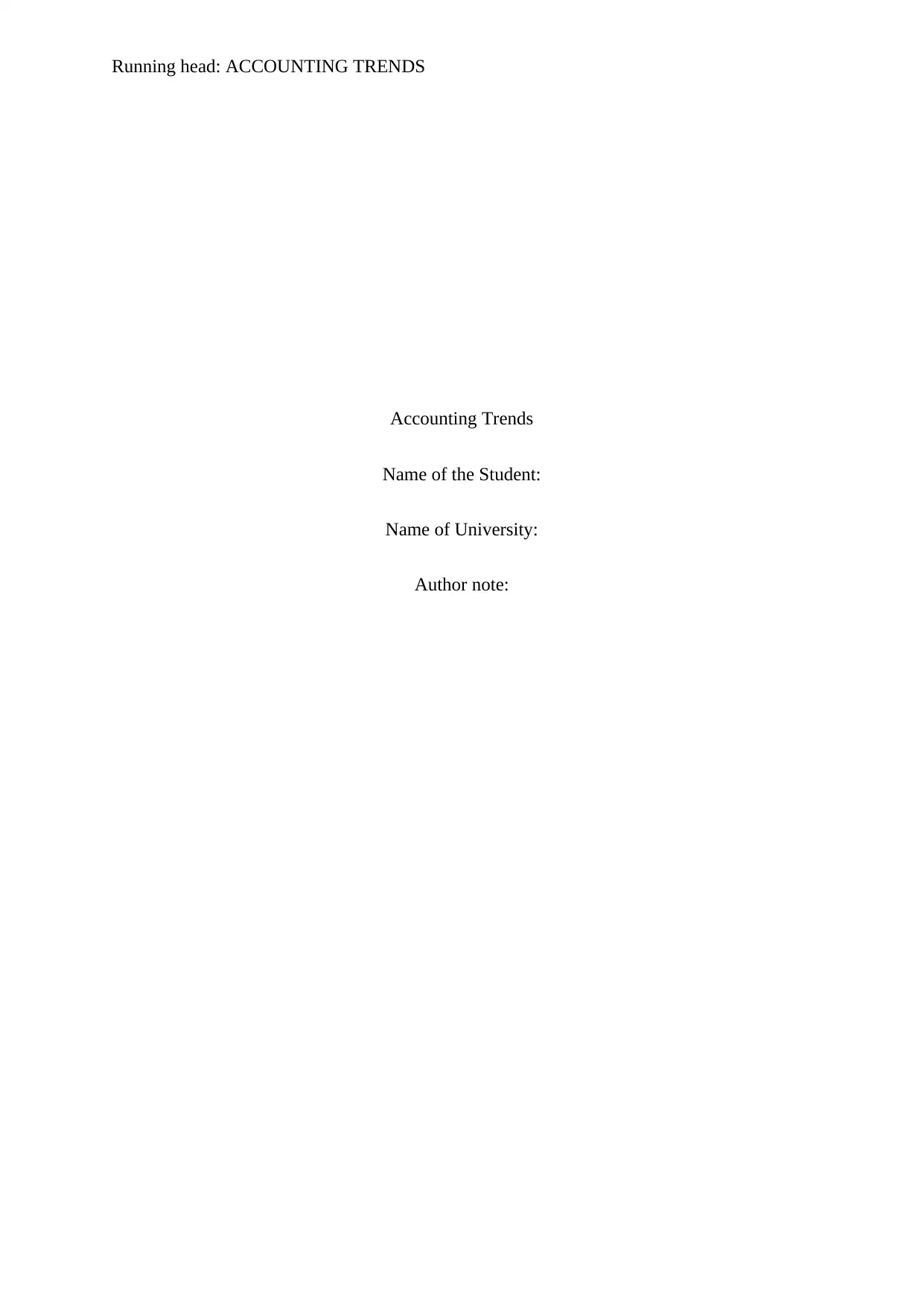
Running head: ACCOUNTING TRENDS
Accounting Trends
Name of the Student:
Name of University:
Author note:
Accounting Trends
Name of the Student:
Name of University:
Author note:
Paraphrase This Document
Need a fresh take? Get an instant paraphrase of this document with our AI Paraphraser
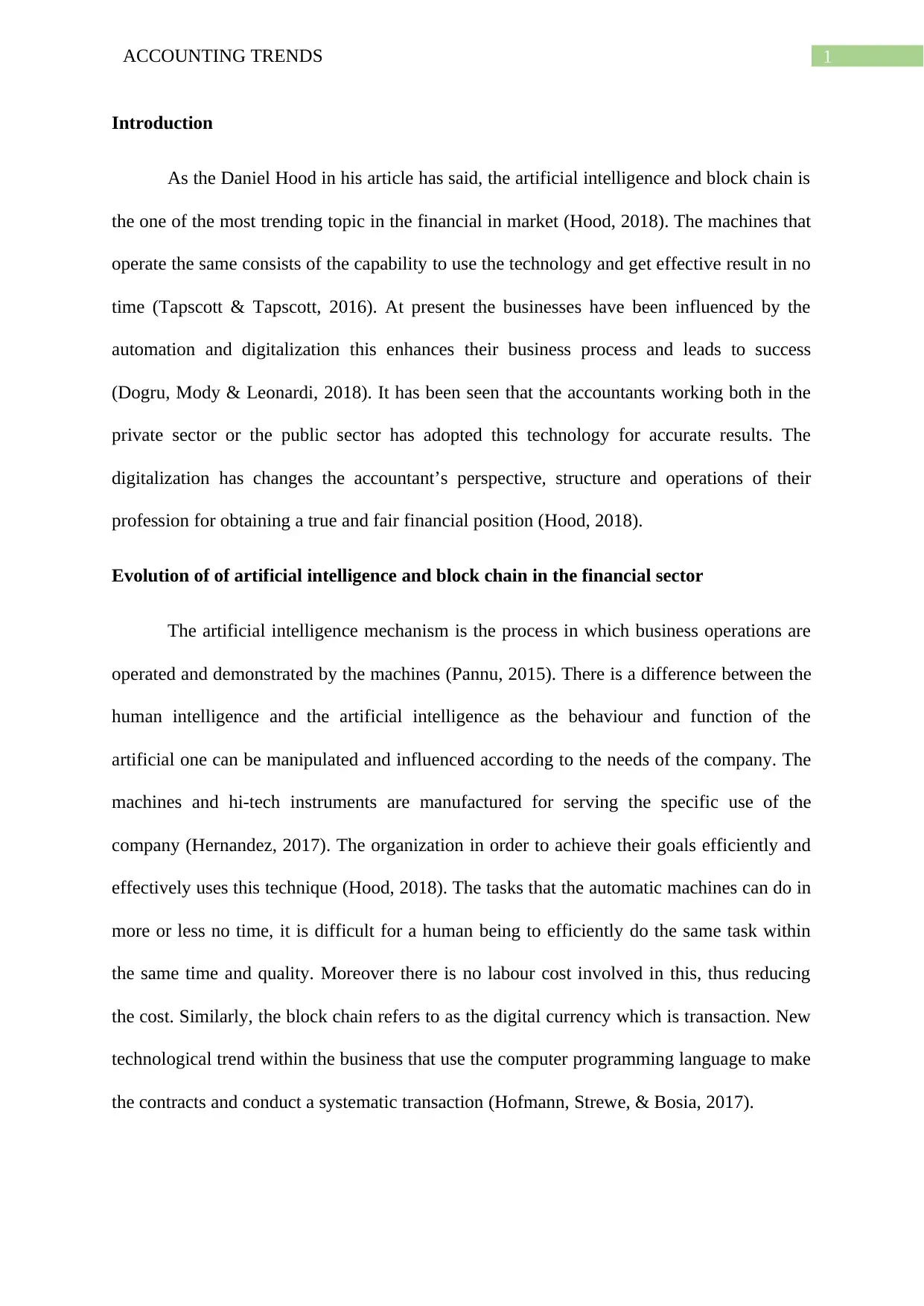
1ACCOUNTING TRENDS
Introduction
As the Daniel Hood in his article has said, the artificial intelligence and block chain is
the one of the most trending topic in the financial in market (Hood, 2018). The machines that
operate the same consists of the capability to use the technology and get effective result in no
time (Tapscott & Tapscott, 2016). At present the businesses have been influenced by the
automation and digitalization this enhances their business process and leads to success
(Dogru, Mody & Leonardi, 2018). It has been seen that the accountants working both in the
private sector or the public sector has adopted this technology for accurate results. The
digitalization has changes the accountant’s perspective, structure and operations of their
profession for obtaining a true and fair financial position (Hood, 2018).
Evolution of of artificial intelligence and block chain in the financial sector
The artificial intelligence mechanism is the process in which business operations are
operated and demonstrated by the machines (Pannu, 2015). There is a difference between the
human intelligence and the artificial intelligence as the behaviour and function of the
artificial one can be manipulated and influenced according to the needs of the company. The
machines and hi-tech instruments are manufactured for serving the specific use of the
company (Hernandez, 2017). The organization in order to achieve their goals efficiently and
effectively uses this technique (Hood, 2018). The tasks that the automatic machines can do in
more or less no time, it is difficult for a human being to efficiently do the same task within
the same time and quality. Moreover there is no labour cost involved in this, thus reducing
the cost. Similarly, the block chain refers to as the digital currency which is transaction. New
technological trend within the business that use the computer programming language to make
the contracts and conduct a systematic transaction (Hofmann, Strewe, & Bosia, 2017).
Introduction
As the Daniel Hood in his article has said, the artificial intelligence and block chain is
the one of the most trending topic in the financial in market (Hood, 2018). The machines that
operate the same consists of the capability to use the technology and get effective result in no
time (Tapscott & Tapscott, 2016). At present the businesses have been influenced by the
automation and digitalization this enhances their business process and leads to success
(Dogru, Mody & Leonardi, 2018). It has been seen that the accountants working both in the
private sector or the public sector has adopted this technology for accurate results. The
digitalization has changes the accountant’s perspective, structure and operations of their
profession for obtaining a true and fair financial position (Hood, 2018).
Evolution of of artificial intelligence and block chain in the financial sector
The artificial intelligence mechanism is the process in which business operations are
operated and demonstrated by the machines (Pannu, 2015). There is a difference between the
human intelligence and the artificial intelligence as the behaviour and function of the
artificial one can be manipulated and influenced according to the needs of the company. The
machines and hi-tech instruments are manufactured for serving the specific use of the
company (Hernandez, 2017). The organization in order to achieve their goals efficiently and
effectively uses this technique (Hood, 2018). The tasks that the automatic machines can do in
more or less no time, it is difficult for a human being to efficiently do the same task within
the same time and quality. Moreover there is no labour cost involved in this, thus reducing
the cost. Similarly, the block chain refers to as the digital currency which is transaction. New
technological trend within the business that use the computer programming language to make
the contracts and conduct a systematic transaction (Hofmann, Strewe, & Bosia, 2017).
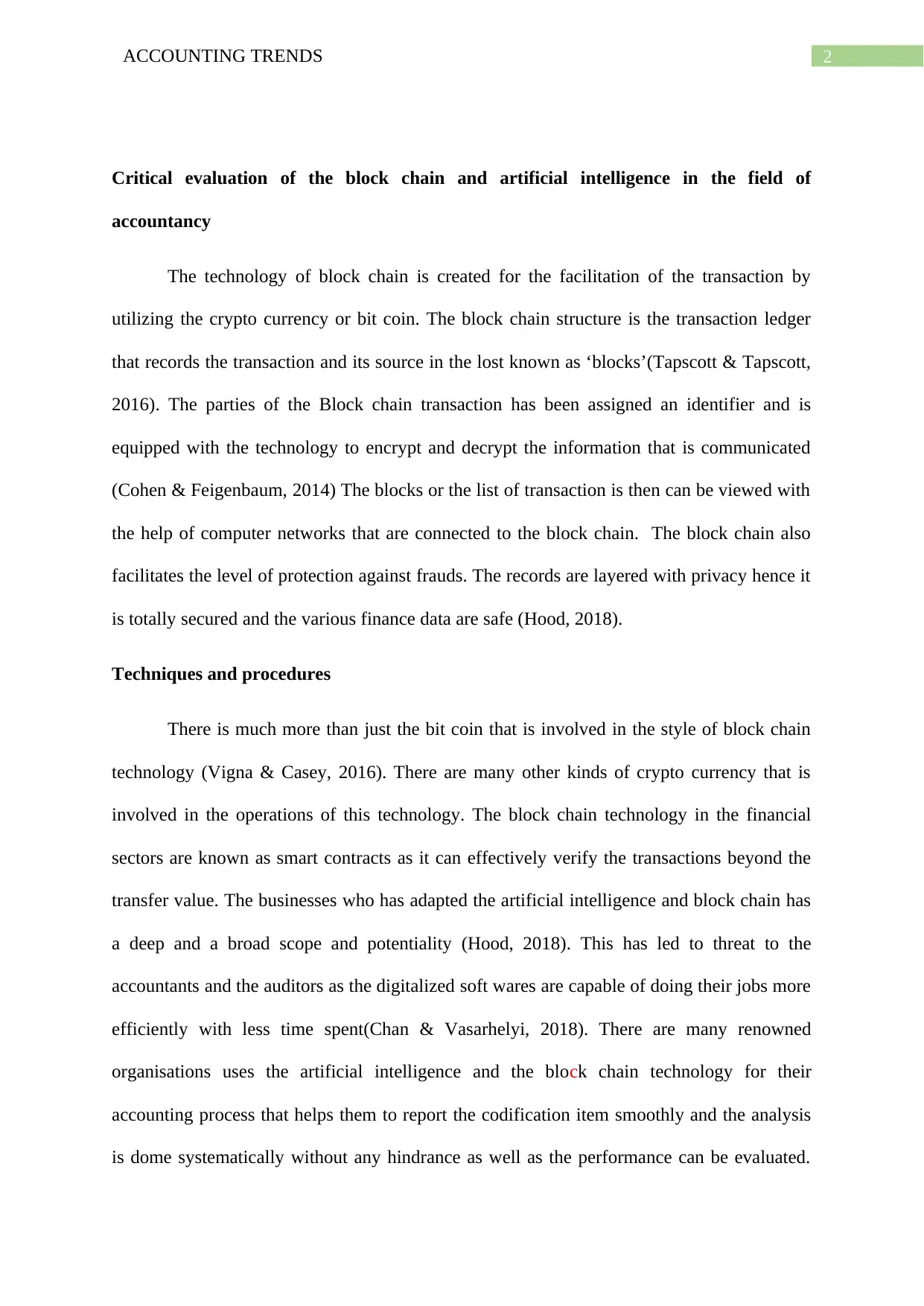
2ACCOUNTING TRENDS
Critical evaluation of the block chain and artificial intelligence in the field of
accountancy
The technology of block chain is created for the facilitation of the transaction by
utilizing the crypto currency or bit coin. The block chain structure is the transaction ledger
that records the transaction and its source in the lost known as ‘blocks’(Tapscott & Tapscott,
2016). The parties of the Block chain transaction has been assigned an identifier and is
equipped with the technology to encrypt and decrypt the information that is communicated
(Cohen & Feigenbaum, 2014) The blocks or the list of transaction is then can be viewed with
the help of computer networks that are connected to the block chain. The block chain also
facilitates the level of protection against frauds. The records are layered with privacy hence it
is totally secured and the various finance data are safe (Hood, 2018).
Techniques and procedures
There is much more than just the bit coin that is involved in the style of block chain
technology (Vigna & Casey, 2016). There are many other kinds of crypto currency that is
involved in the operations of this technology. The block chain technology in the financial
sectors are known as smart contracts as it can effectively verify the transactions beyond the
transfer value. The businesses who has adapted the artificial intelligence and block chain has
a deep and a broad scope and potentiality (Hood, 2018). This has led to threat to the
accountants and the auditors as the digitalized soft wares are capable of doing their jobs more
efficiently with less time spent(Chan & Vasarhelyi, 2018). There are many renowned
organisations uses the artificial intelligence and the block chain technology for their
accounting process that helps them to report the codification item smoothly and the analysis
is dome systematically without any hindrance as well as the performance can be evaluated.
Critical evaluation of the block chain and artificial intelligence in the field of
accountancy
The technology of block chain is created for the facilitation of the transaction by
utilizing the crypto currency or bit coin. The block chain structure is the transaction ledger
that records the transaction and its source in the lost known as ‘blocks’(Tapscott & Tapscott,
2016). The parties of the Block chain transaction has been assigned an identifier and is
equipped with the technology to encrypt and decrypt the information that is communicated
(Cohen & Feigenbaum, 2014) The blocks or the list of transaction is then can be viewed with
the help of computer networks that are connected to the block chain. The block chain also
facilitates the level of protection against frauds. The records are layered with privacy hence it
is totally secured and the various finance data are safe (Hood, 2018).
Techniques and procedures
There is much more than just the bit coin that is involved in the style of block chain
technology (Vigna & Casey, 2016). There are many other kinds of crypto currency that is
involved in the operations of this technology. The block chain technology in the financial
sectors are known as smart contracts as it can effectively verify the transactions beyond the
transfer value. The businesses who has adapted the artificial intelligence and block chain has
a deep and a broad scope and potentiality (Hood, 2018). This has led to threat to the
accountants and the auditors as the digitalized soft wares are capable of doing their jobs more
efficiently with less time spent(Chan & Vasarhelyi, 2018). There are many renowned
organisations uses the artificial intelligence and the block chain technology for their
accounting process that helps them to report the codification item smoothly and the analysis
is dome systematically without any hindrance as well as the performance can be evaluated.
⊘ This is a preview!⊘
Do you want full access?
Subscribe today to unlock all pages.

Trusted by 1+ million students worldwide
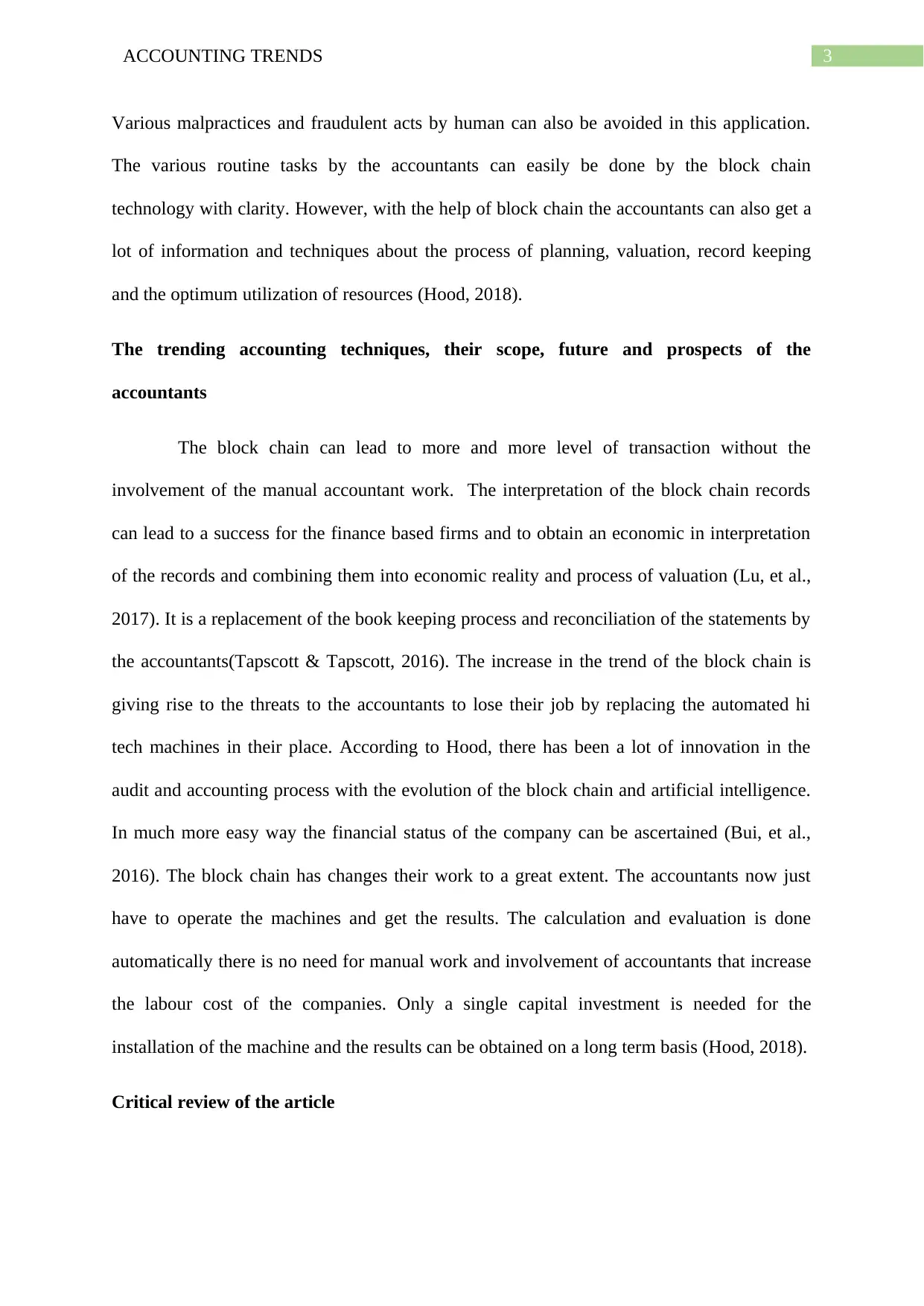
3ACCOUNTING TRENDS
Various malpractices and fraudulent acts by human can also be avoided in this application.
The various routine tasks by the accountants can easily be done by the block chain
technology with clarity. However, with the help of block chain the accountants can also get a
lot of information and techniques about the process of planning, valuation, record keeping
and the optimum utilization of resources (Hood, 2018).
The trending accounting techniques, their scope, future and prospects of the
accountants
The block chain can lead to more and more level of transaction without the
involvement of the manual accountant work. The interpretation of the block chain records
can lead to a success for the finance based firms and to obtain an economic in interpretation
of the records and combining them into economic reality and process of valuation (Lu, et al.,
2017). It is a replacement of the book keeping process and reconciliation of the statements by
the accountants(Tapscott & Tapscott, 2016). The increase in the trend of the block chain is
giving rise to the threats to the accountants to lose their job by replacing the automated hi
tech machines in their place. According to Hood, there has been a lot of innovation in the
audit and accounting process with the evolution of the block chain and artificial intelligence.
In much more easy way the financial status of the company can be ascertained (Bui, et al.,
2016). The block chain has changes their work to a great extent. The accountants now just
have to operate the machines and get the results. The calculation and evaluation is done
automatically there is no need for manual work and involvement of accountants that increase
the labour cost of the companies. Only a single capital investment is needed for the
installation of the machine and the results can be obtained on a long term basis (Hood, 2018).
Critical review of the article
Various malpractices and fraudulent acts by human can also be avoided in this application.
The various routine tasks by the accountants can easily be done by the block chain
technology with clarity. However, with the help of block chain the accountants can also get a
lot of information and techniques about the process of planning, valuation, record keeping
and the optimum utilization of resources (Hood, 2018).
The trending accounting techniques, their scope, future and prospects of the
accountants
The block chain can lead to more and more level of transaction without the
involvement of the manual accountant work. The interpretation of the block chain records
can lead to a success for the finance based firms and to obtain an economic in interpretation
of the records and combining them into economic reality and process of valuation (Lu, et al.,
2017). It is a replacement of the book keeping process and reconciliation of the statements by
the accountants(Tapscott & Tapscott, 2016). The increase in the trend of the block chain is
giving rise to the threats to the accountants to lose their job by replacing the automated hi
tech machines in their place. According to Hood, there has been a lot of innovation in the
audit and accounting process with the evolution of the block chain and artificial intelligence.
In much more easy way the financial status of the company can be ascertained (Bui, et al.,
2016). The block chain has changes their work to a great extent. The accountants now just
have to operate the machines and get the results. The calculation and evaluation is done
automatically there is no need for manual work and involvement of accountants that increase
the labour cost of the companies. Only a single capital investment is needed for the
installation of the machine and the results can be obtained on a long term basis (Hood, 2018).
Critical review of the article
Paraphrase This Document
Need a fresh take? Get an instant paraphrase of this document with our AI Paraphraser
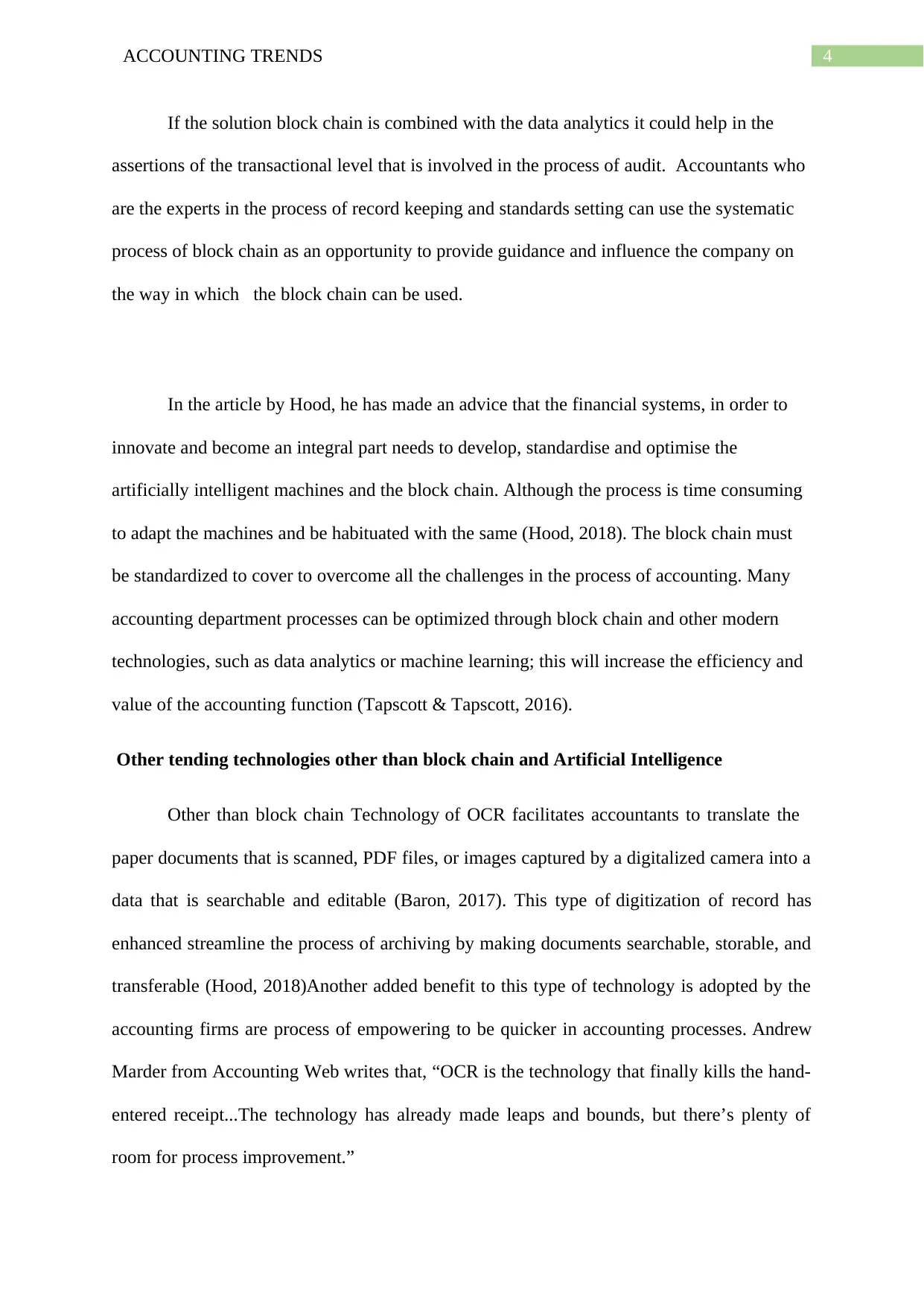
4ACCOUNTING TRENDS
If the solution block chain is combined with the data analytics it could help in the
assertions of the transactional level that is involved in the process of audit. Accountants who
are the experts in the process of record keeping and standards setting can use the systematic
process of block chain as an opportunity to provide guidance and influence the company on
the way in which the block chain can be used.
In the article by Hood, he has made an advice that the financial systems, in order to
innovate and become an integral part needs to develop, standardise and optimise the
artificially intelligent machines and the block chain. Although the process is time consuming
to adapt the machines and be habituated with the same (Hood, 2018). The block chain must
be standardized to cover to overcome all the challenges in the process of accounting. Many
accounting department processes can be optimized through block chain and other modern
technologies, such as data analytics or machine learning; this will increase the efficiency and
value of the accounting function (Tapscott & Tapscott, 2016).
Other tending technologies other than block chain and Artificial Intelligence
Other than block chain Technology of OCR facilitates accountants to translate the
paper documents that is scanned, PDF files, or images captured by a digitalized camera into a
data that is searchable and editable (Baron, 2017). This type of digitization of record has
enhanced streamline the process of archiving by making documents searchable, storable, and
transferable (Hood, 2018)Another added benefit to this type of technology is adopted by the
accounting firms are process of empowering to be quicker in accounting processes. Andrew
Marder from Accounting Web writes that, “OCR is the technology that finally kills the hand-
entered receipt...The technology has already made leaps and bounds, but there’s plenty of
room for process improvement.”
If the solution block chain is combined with the data analytics it could help in the
assertions of the transactional level that is involved in the process of audit. Accountants who
are the experts in the process of record keeping and standards setting can use the systematic
process of block chain as an opportunity to provide guidance and influence the company on
the way in which the block chain can be used.
In the article by Hood, he has made an advice that the financial systems, in order to
innovate and become an integral part needs to develop, standardise and optimise the
artificially intelligent machines and the block chain. Although the process is time consuming
to adapt the machines and be habituated with the same (Hood, 2018). The block chain must
be standardized to cover to overcome all the challenges in the process of accounting. Many
accounting department processes can be optimized through block chain and other modern
technologies, such as data analytics or machine learning; this will increase the efficiency and
value of the accounting function (Tapscott & Tapscott, 2016).
Other tending technologies other than block chain and Artificial Intelligence
Other than block chain Technology of OCR facilitates accountants to translate the
paper documents that is scanned, PDF files, or images captured by a digitalized camera into a
data that is searchable and editable (Baron, 2017). This type of digitization of record has
enhanced streamline the process of archiving by making documents searchable, storable, and
transferable (Hood, 2018)Another added benefit to this type of technology is adopted by the
accounting firms are process of empowering to be quicker in accounting processes. Andrew
Marder from Accounting Web writes that, “OCR is the technology that finally kills the hand-
entered receipt...The technology has already made leaps and bounds, but there’s plenty of
room for process improvement.”
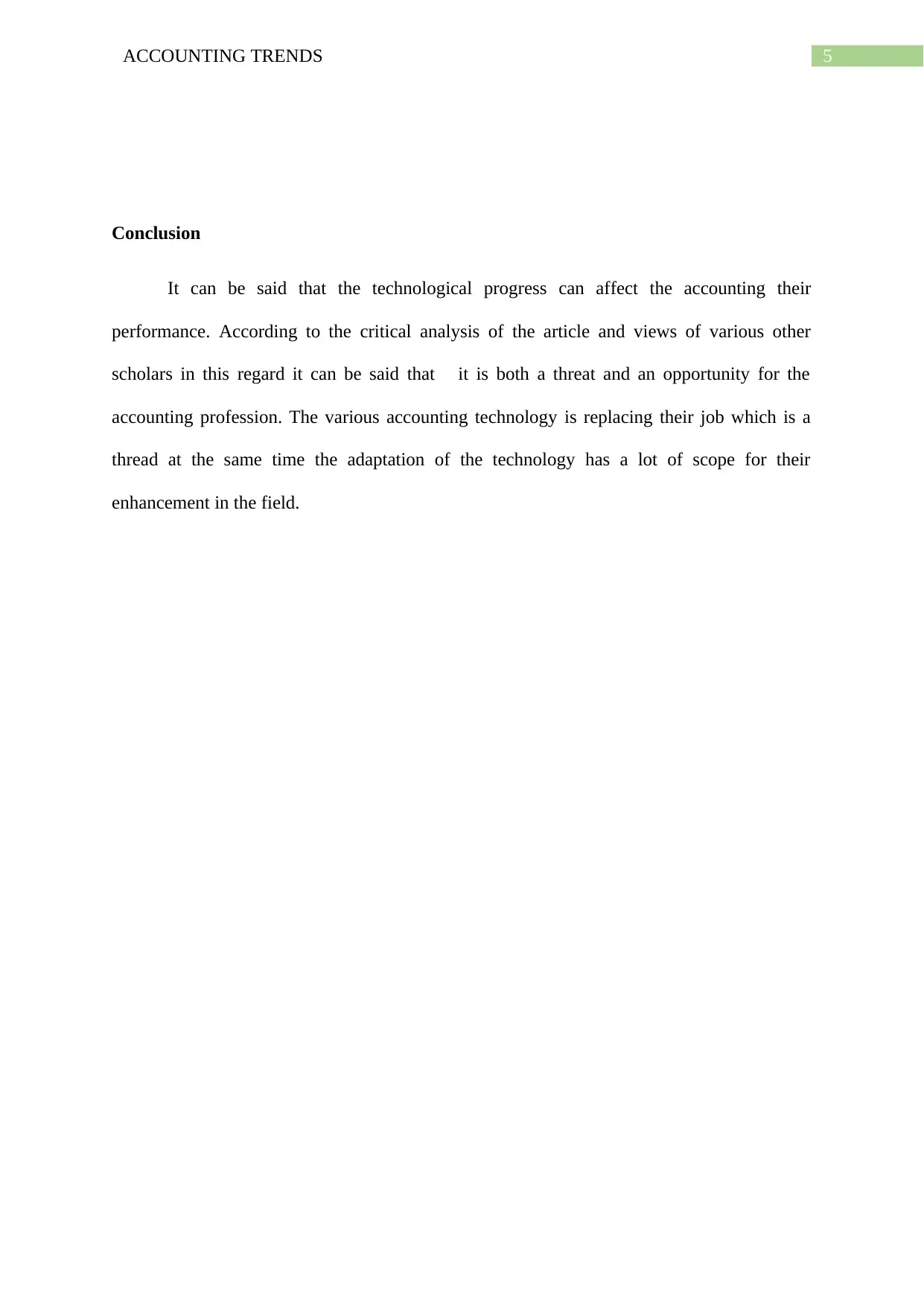
5ACCOUNTING TRENDS
Conclusion
It can be said that the technological progress can affect the accounting their
performance. According to the critical analysis of the article and views of various other
scholars in this regard it can be said that it is both a threat and an opportunity for the
accounting profession. The various accounting technology is replacing their job which is a
thread at the same time the adaptation of the technology has a lot of scope for their
enhancement in the field.
Conclusion
It can be said that the technological progress can affect the accounting their
performance. According to the critical analysis of the article and views of various other
scholars in this regard it can be said that it is both a threat and an opportunity for the
accounting profession. The various accounting technology is replacing their job which is a
thread at the same time the adaptation of the technology has a lot of scope for their
enhancement in the field.
⊘ This is a preview!⊘
Do you want full access?
Subscribe today to unlock all pages.

Trusted by 1+ million students worldwide
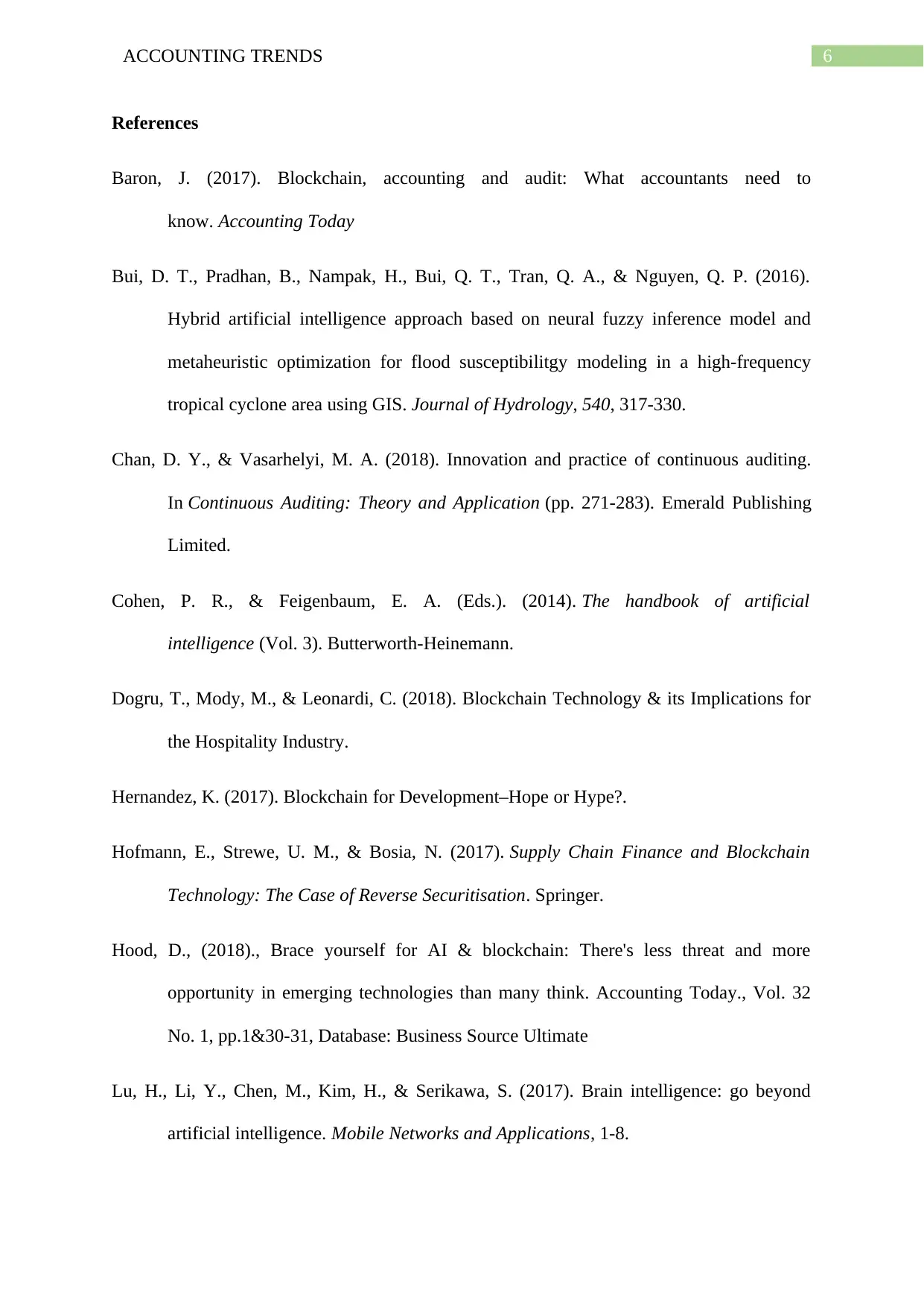
6ACCOUNTING TRENDS
References
Baron, J. (2017). Blockchain, accounting and audit: What accountants need to
know. Accounting Today
Bui, D. T., Pradhan, B., Nampak, H., Bui, Q. T., Tran, Q. A., & Nguyen, Q. P. (2016).
Hybrid artificial intelligence approach based on neural fuzzy inference model and
metaheuristic optimization for flood susceptibilitgy modeling in a high-frequency
tropical cyclone area using GIS. Journal of Hydrology, 540, 317-330.
Chan, D. Y., & Vasarhelyi, M. A. (2018). Innovation and practice of continuous auditing.
In Continuous Auditing: Theory and Application (pp. 271-283). Emerald Publishing
Limited.
Cohen, P. R., & Feigenbaum, E. A. (Eds.). (2014). The handbook of artificial
intelligence (Vol. 3). Butterworth-Heinemann.
Dogru, T., Mody, M., & Leonardi, C. (2018). Blockchain Technology & its Implications for
the Hospitality Industry.
Hernandez, K. (2017). Blockchain for Development–Hope or Hype?.
Hofmann, E., Strewe, U. M., & Bosia, N. (2017). Supply Chain Finance and Blockchain
Technology: The Case of Reverse Securitisation. Springer.
Hood, D., (2018)., Brace yourself for AI & blockchain: There's less threat and more
opportunity in emerging technologies than many think. Accounting Today., Vol. 32
No. 1, pp.1&30-31, Database: Business Source Ultimate
Lu, H., Li, Y., Chen, M., Kim, H., & Serikawa, S. (2017). Brain intelligence: go beyond
artificial intelligence. Mobile Networks and Applications, 1-8.
References
Baron, J. (2017). Blockchain, accounting and audit: What accountants need to
know. Accounting Today
Bui, D. T., Pradhan, B., Nampak, H., Bui, Q. T., Tran, Q. A., & Nguyen, Q. P. (2016).
Hybrid artificial intelligence approach based on neural fuzzy inference model and
metaheuristic optimization for flood susceptibilitgy modeling in a high-frequency
tropical cyclone area using GIS. Journal of Hydrology, 540, 317-330.
Chan, D. Y., & Vasarhelyi, M. A. (2018). Innovation and practice of continuous auditing.
In Continuous Auditing: Theory and Application (pp. 271-283). Emerald Publishing
Limited.
Cohen, P. R., & Feigenbaum, E. A. (Eds.). (2014). The handbook of artificial
intelligence (Vol. 3). Butterworth-Heinemann.
Dogru, T., Mody, M., & Leonardi, C. (2018). Blockchain Technology & its Implications for
the Hospitality Industry.
Hernandez, K. (2017). Blockchain for Development–Hope or Hype?.
Hofmann, E., Strewe, U. M., & Bosia, N. (2017). Supply Chain Finance and Blockchain
Technology: The Case of Reverse Securitisation. Springer.
Hood, D., (2018)., Brace yourself for AI & blockchain: There's less threat and more
opportunity in emerging technologies than many think. Accounting Today., Vol. 32
No. 1, pp.1&30-31, Database: Business Source Ultimate
Lu, H., Li, Y., Chen, M., Kim, H., & Serikawa, S. (2017). Brain intelligence: go beyond
artificial intelligence. Mobile Networks and Applications, 1-8.
Paraphrase This Document
Need a fresh take? Get an instant paraphrase of this document with our AI Paraphraser
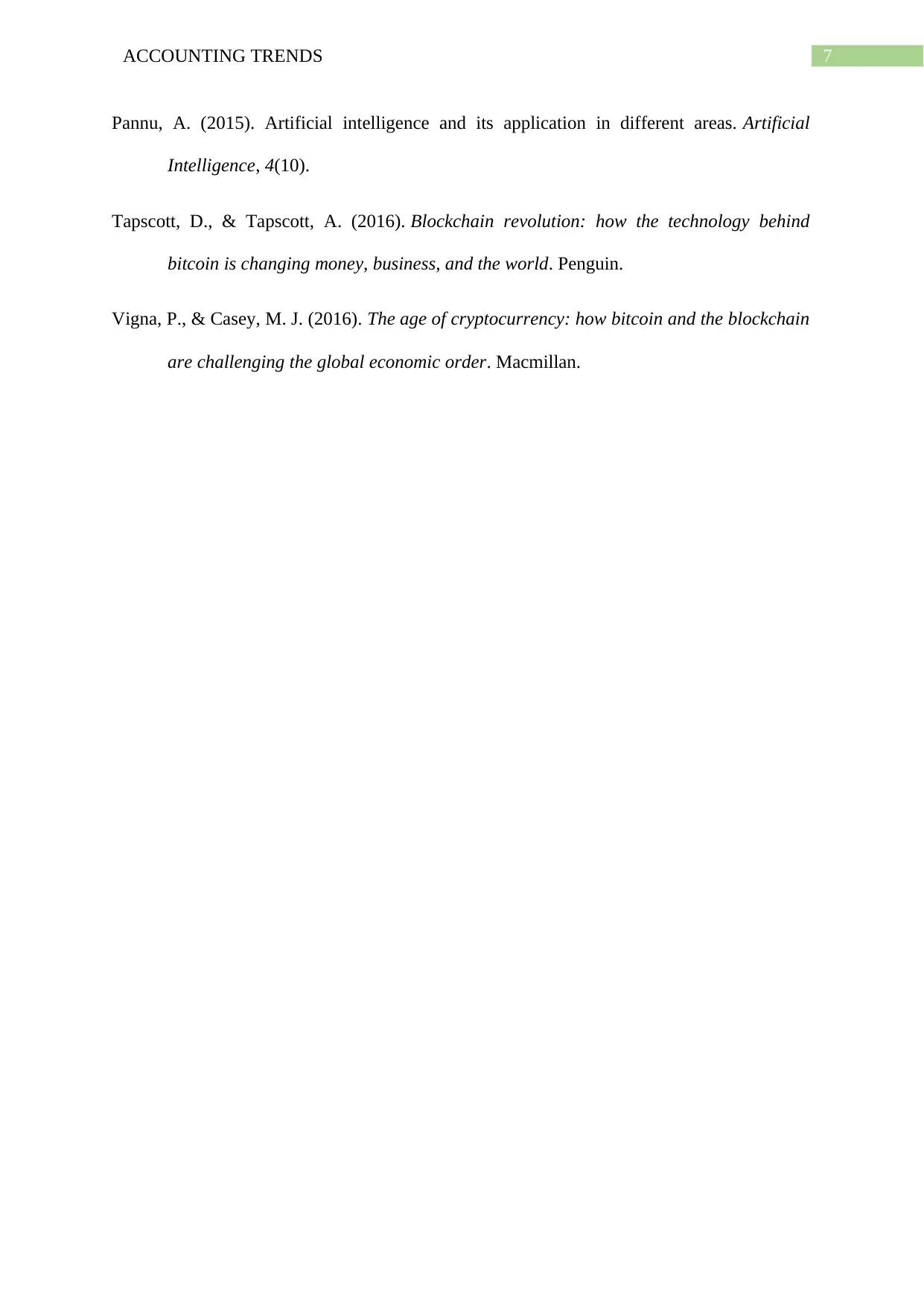
7ACCOUNTING TRENDS
Pannu, A. (2015). Artificial intelligence and its application in different areas. Artificial
Intelligence, 4(10).
Tapscott, D., & Tapscott, A. (2016). Blockchain revolution: how the technology behind
bitcoin is changing money, business, and the world. Penguin.
Vigna, P., & Casey, M. J. (2016). The age of cryptocurrency: how bitcoin and the blockchain
are challenging the global economic order. Macmillan.
Pannu, A. (2015). Artificial intelligence and its application in different areas. Artificial
Intelligence, 4(10).
Tapscott, D., & Tapscott, A. (2016). Blockchain revolution: how the technology behind
bitcoin is changing money, business, and the world. Penguin.
Vigna, P., & Casey, M. J. (2016). The age of cryptocurrency: how bitcoin and the blockchain
are challenging the global economic order. Macmillan.
1 out of 8
Related Documents
Your All-in-One AI-Powered Toolkit for Academic Success.
+13062052269
info@desklib.com
Available 24*7 on WhatsApp / Email
![[object Object]](/_next/static/media/star-bottom.7253800d.svg)
Unlock your academic potential
Copyright © 2020–2026 A2Z Services. All Rights Reserved. Developed and managed by ZUCOL.



